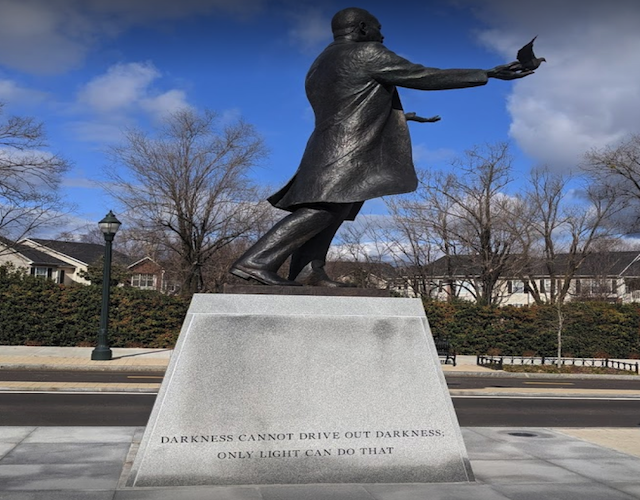Monday, January 16, 2023 is Rev. Dr. Martin Luther King Jr. Day. Tributes to civil rights leader Martin Luther King Jr. were held in the Unites States, nationwide. This year, unlike in 2021 and 2022 hit by worldwide COVID-19 pandemic, people interractions were allowed. The day has been marked by commemorations including events, marches, speeches, and peaceful protests to remember and celebrate the national civil rights leader who was instrumental in challenging the racial caste system that delineated how millions of Americans lived their lives and promoted racial injustices targeting minorities, especially Blacks.
Martin Luther King Jr. Day is an annual federal holiday since 1986. All 50 states celebrate the public holiday on the third Monday in January, but not all states, cities and towns dedicate it solely to Rev. Dr. Martin Luther King Jr.
Rev Martin Luther King Jr.'s "Stand Up for that which is Right"
Commemorations continue to highlight that the life and times of the Rev. Martin Luther King Jr. cannot be summarized in an article, not even in books or tomes.
What is sure is that Martin Luther’s legacy focused on social justice, economic mobility, and civil rights in general. Hence, recent commemorations have focused on the treatment of minorities by law enforcement and corporations with persistent calls for the police reform, racial justice, fairness, economic disparities, equality, and equitability. This year, like years before, commemorations have continue to call for fairness, social justice, economic fairness, police reform, racial justice, and most importantly the fair electoral process.
In fact, as Rev. Marting Luther King Jr.. said: "A man dies when he refuses to stand up for that which is right. A man dies when he refuses to stand up for justice. A man dies when he refuses to take a stand for that which is true."
However, over and over again, the commemorations and the events to celebrate his life and achievements are both a testimony on how far America has come, thanks to Rev. Martin Luther King Jr. and all the Civil Rights movement leaders and activists, and the momentous task still ahead. The days over the most recent years, like in Dobie Gray's Drift Away song, have been looking as drifting away but there is still hope, to carry people through, to free their mind and soul, to give them joy, and to make them strong.
And, as Sam Cooke said in his song "A Change is Gonna Come", the change Rev. Dr. Martin Luther King Jr dreamed about, years ago, in 1963, is on a long term progress.
New Advances, but Yet More Barriers: Voting Rights and Economic Disparities In the Focus.
Many advances have been made in the last years, including the election and the reelection of Reverend Raphael Warnock, becoming Georgia's first-ever Black US senator and also the first Black Democratic US senator from a southern state (see US 2022 Election: In Georgia Runoff, Rev. Raphael Warnock Did It Again; What is Next?). His victory helped the Democrats to regain control of the US Senate both in 2021 - 2022 and 2023.
Afterwards, many more advances were made: in late 2021, the world watched as three white men were convicted in the killing of Ahmaud Arbery, a Black man (See here Brunswick - Georgia - USA: Ahmaud Arbery Was Murdered for "Jogging While Black" According to Conviction).
Meanwhile, there is a major thorny issue in the United States of America that has been aggravated since 2021: "Challenge to Voting Rights". US President Joe Biden, in a speech in Georgia, US, on January 11, 2022 called "Voting Rights" efforts the "battle for the soul of America," comparing it to the fight against segregation by Rev. Martin Luther King Jr.
Advertisement
Get the following books on Amazon:

Legs of Tornado: The Human Who Outran the Wind, an African tale about a human from a humble upbringing who outran the wind, defeated evil spirits, overcame his fate, became a respected clan chief, and triumphed ever after
Click Here to Get the books: Even Roosters Dream to Fly and Legs of Tornado
Even Roosters Dream to Fly along with Legs of Tornado are also available on Amazon worldwide and soon to several other platforms:
For more on the book, the author, the inspiration of the stories, Visit the author website here
Since the 2020 elections, legislators in nineteen states have passed and enacted bills designed to restrict voting rights, targeting for minorities. Since then, Democrats in Congress have drafted two bills to protect franchise rights.
On Monday, January 16, 2023, President Biden, during the keynote speech at the National Action Network’s (NAN) annual breakfast to mark Martin Luther King Jr. Day, highlighted a major step forward, saying that the Democrats and Republicans were working together on the Electoral Count Reform Act and urged the US Congress to pass the John R. Lewis Voting Rights Advancement Act and further protect “the sacred right to vote.”
Two voting bills have been in play for while.
The first bill is the Voting Rights Act of 2019 initiated by civil rights hero John Lewis, and renamed John Lewis Voting Rights Advancement (JLVRA) Act after his death (See here: Atlanta, Georgia: US and the World Say Goodbye to Civil Rights Icon John R. Lewis.). The bill was introduced in the Senate by Patrick Leahey (D-VT) and co-sponsored by forty-seven Democrats and Lisa Murkowski (R-AK).
The second bill, the Freedom to Vote Act, is a slimmed-down version of the "For the People Act" . Both bills have been approved by the House but the filibuster provision has made bringing either to a vote in the Senate impossible. Hence, a major huddle is on the path to the Voting Rights.
The Voting Rights challenges remind of the times of the Civil Rights movement. In fact, during these times, Rev. Martin Luther King, Jr.’s sermons at Ebenezer provided insights into racial and social problems of the day, that are still being faced even today. In one sermon, on the Fourth of July in 1965, a month before the Voting Rights Act was enacted, Rev Martin Luther King preached:
“Now ever since the founding fathers of our nation dreamed this dream in all of its magnificence—to use a big word that the psychiatrists use—America has been something of a schizophrenic personality, tragically divided against herself . On the one hand we have proudly professed the great principles of democracy, but on the other hand we have sadly practiced the very opposite of those principles. But now more than ever before, America is challenged to realize its dream, for the shape of the world today does not permit our nation the luxury of an anemic democracy. And the price that America must pay for the continued oppression of the Negro and other minority groups is the price of its own destruction.”
President Joe Biden also insisted on pushing for addressing economic disparities and closing the racial wealth gap by building Black generational wealth, funding for historically Black colleges and universities, and combating discrimination in housing.
We Shall Overcome
Martin Luther King, Jr., used "we shall overcome.” call in his final sermon in Memphis in 1968, just before his assassination. The words echoed several days later in the singing of the 50,000 people at his funeral.
Peter Seeger composed the song "We Shall Overcome," that became the hymn of civil rights activists across the US and the World. In the song the following words highlight the struggle in Rev Martin Luther King Jr's time and even now:
"This is the reason that I want to fight,
Not 'cause everything's perfect, or everything's right.
No, it's just the opposite: I'm fightin' because
I want a better America, and better laws,
And better homes, and jobs, and schools,
And no more Jim Crow, and no more rules like
"You can't ride on this train 'cause you're a Negro,"
"You can't live here 'cause you're a Jew,"
"You can't work here 'cause you're a union man."
©2023 AfroAmerica Network.
















